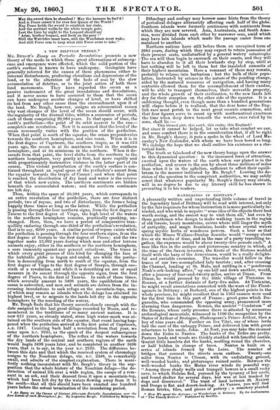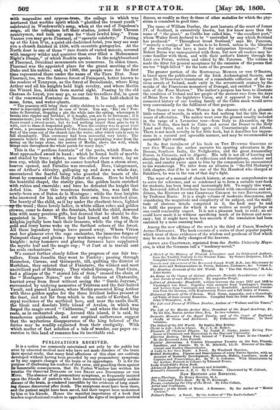WANDERINGS IN BRITTANY. * A pleasantly written and unpretending little volume
of travel in the legendary land of Brittany will be read with interest, not only by the fair inquirers for whose instruction it is more particularly in- tended, and who wish to acquire " some idea of the objects there best worth seeing, and the easiest way to visit them all, but even by those gentlemen who design to make walking tours in the region of old forests, hoary mountains, cairns where still linger the myth of antiquity, and magic fountains, beside whose crystal waters spring mystic herbs of wondrous powers. Such a tour as that which the Misses Wallace-Dunlop describe would " occupy about five or six weeks of time, and• in the case of a party travelling to- gether, the expenses would be about twenty-five pounds each." A tour like this in the antique and picturesque country in which, at the time of the Saxon invasion, the Krote of the Bretons wedded itself with the harp of the Armericans, would be a really delightr ful and enviable excursion. The traveller would follow in the traces of our two accomplished lady tourists ; and, after crossing the Channel, landing at St. Maio, and rattling in a " ponderous Noah's-ark-looking affair," up one hill and down another, would, after a journey of four-and-twenty miles, arrive at Dinan. From Dinan, he would proceed by the little village of Tinteniac to Rennes, at a further distance of forty-five miles. At Tinteniac, he might recall associations connected with the wars of the Plant- agenets in Brittany ; at Becherel, one of the highest points in the whole province, he might recollect that in 1363 cannon were used for the first time in this part of France ; great guns which Du- guescliu, who commanded the opposing army, pronounced more alarming than dangerous. Rennes, the ancient Condatum " of the Romans, whose early presence there is attested by numerous archteologieal memorials, witnessed in 1196 the recognition by the States of Arthur of Bretagne, Shakespeare's Prince Arthur, then a boy of nine years old. Further on lies Vitro, one of whose lords had the care of the unhappy Prince, and delivered him with great reluctance to his uncle, John. At Nort, you may take the steamer down the Erdre to Nantes. The banks of the Erdre are pretty. Pasture lands and woods are thickly studded with fanciful castles. Quaint little hamlets dot the banks, nestling round the churches, or half hidden in clumps of trees. Nantes is built on a series of islands formed by the Loire. The number of bridges that connect the streets seem endless. Twenty-one
miles from Nantes is Clisson, with its undulating ground, well-wooded banks, and picturesque ruined castle. Between the well-wooded banks the Moine river winds its peaceful way. "Among these shady walls and tranquil bowers is a small rocky cave, to which Heloise fled, pursued by the tyranny of her uncle,
and found shelter for several days, but was at last tracked by dogs and discovered." The tract of land between St. Nazirre and Donge is flat and desert-looking. At Vannes, you will find Roman bricks, tiles, and pieces of pottery ; a cemetery planted • How We :pent the Autumn 'or Wanderings in Brittany. By the Authoresses of " The Timely Retreat." Published by Bentley. with magnolias and cypress-trees, the college in which was nurtured that warlike spirit which " glorified the truant youth " celebrated in Wordsworth's song, when at the end of Napoleon's reign, all the collegians left their studies, joined their Chonan countrymen, and took up arms for "their lawful king." From Vannes you may go to Ploermel, of " operatic celebrity." Putting up at the Lion D or, a.quiet old-fashioned hotel, you may see near you a church finished in 1556, with eccentric guregoyles. At the North door is one of those " rare fronts of varied mosaic, covered with imagery wilder and quainter than ever filled a Midsummer Night's Dream," of which Ruskin speaks. In the neighbourhood of Ploermel, Druidical monuments are numerous. In olden times, Ploermel was the appointed place for the grand meeting of the Duke and his nobles ; and, in 1309, the people were for the first time represented there under the name of the Tiers Etat. Near Ploermel, too, was the famous forest of Paimpont, better known to the readers of Tennyson, as the forest of Broceliande, where King Arthur and all his knights held high revelry, and where Merlin the Wizard lies, hidden from mortal sight. Passing by the old Chateau de Loyat, you may go, as our fair travellers did, in quest of the renowned Fontaine de Barenton. It lies half-choked in tars, ferns, and water-plants. ' The peasants still bring their sickly children to be cured, and say the water is especially powerful in case of fever. You say, ! ris Fon- taine de Barenton, dropping a pin the while into the spring, whereupon it breaks into ripples and bubbles; if it laughs, you are to be fortunate ; if it remains mute, you will be unlucky. Tradition and poesy both say the water fizzes round a sword-point, but we had nothing larger than in to try it with, and to these it responded gaily. When the country was in great want of rain, a procession was formed to the fountain, and the priest dipped the foot of the cross out of the church into the water, after which rain is sure to fall abundantly. This ceremony had been successful very lately. The peasants believe the priest can punish them by sprinkling sprinklino. water from the spring on the large stone, the perron of Merlin, above the well, which beings rain throughout the whole parish for many days."
This is the " perilous fountain" of the poets, which Huon de Men approached sword in hand ; which he found built of marble and shaded by trees ; where, near the silver clear water, lay an iron cup, which the knight no sooner touched than a storm arose, heaven opened, and Paradise was revealed. Here, Calogrenant, one of Arthur's chieLfi ' galloping up and down a whole day, encountered the f being who guarded the beasts of the forest by command of the Holy Father at Rome. Here he beheld the beautiful chapel, the stately pine, the golden basin enriched with rubies and emeralds ; and here he defeated the knight that defied him. Near this wondrous fountain, too, was laid the newly-born son of Buten de la Montagne ; while the four knights who answered for his safety with their own lives watched near. The beauty of the child, as it lay under the chestnut-trees, lighted
----ttrtke-weed ; three lovely ladies, in white silken robes and golden crowns, came to dance at the fountain, beheld the child, dowered him with many precious gifts, but decreed that he should be dis- appointed in love. When they had kissed and left him, the knightsjoyfully bore back their treasure, while the ring of their gold and ivory horns woke up the furthest echoes of the forest. All these legendary beings have passed away. Where Vivien east her glamour over the sage enchanter, the immense forges of Paimpont clang and gleam ; busy workmen replace the visionary knights ; noisy hammers and glaring furnaces have supplanted the mystic leaf and the magic cup ; ' et Part et le travail sent lee seals enchanteurs."
We cannot further closely follow the progress of our fair tra- vellers. From Josselin they went to Pontivy ; passing through Hennebon, Carnac, and Qtiimperle, till, quitting the district of Morbihan, they entered that of Finisterre, the wildest and most uncivilized part of Brittany. They visited Quimper, Pont Croix, had a glimpse of the " storied Isle of &in," crossed the chain of the " Montagnes Noires," saw the old fortress at Chateaulin, hurried away from Brest without seeing the " Garde Joyeuse," surrounded by undying memories of Tristram and the fair-haired Yseult, and passed Lannion, where Merlin presented King Arthur with three golden apples for the three liveliest ladies present at the feast, and not far from which is the castle of Kerduel, the royal residence of the mythical hero, and near the castle itself, the bleak and -desolate little island of Avalon, in which was forged the magic sword " Caliboume," and where the dead king rests, as in enchanted sleep. Around this island, it is said, lie treacherous quicksands and our sceptical authoresses suggest that the mysterious disappearance of the king beloved of the fairies may be readily explained from their contiguity. With which matter of fact solution of a tale of wonder, our paper ex- cursion in this land of romance has its inevitable end.



























 Previous page
Previous page